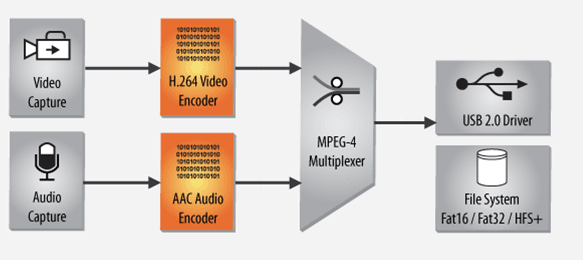 |
| . |
|
The Need for Video Compression |
|
Video, be it film, analog or digital, is a series of still
images, called frames, which are displayed in quick succession
to provide the illusion of motion. Smooth motion is achieved at
about 30 frames per second. A one hour television show is
comprised of about 108,000 frames, each with over 300,000
pixels. In order to make digital video practical, it needs to be
compressed. Video compression works by identifying similarities
between a series of frames and eliminating the redundant
information. |
|
Why H.264? |
The DVD developed in the early 1990s uses the MPEG-2 video
compression standard. Since the introduction of the DVD, both the
amount of processing power available in consumer electronic
devices and the sophistication and effectiveness of video
compression techniques has increased significantly. In the mid
1990s MPEG-4 was developed and offered a 25% increase in
compression over MPEG-2. The H.264 standard (also called AVC and
MPEG-4 Part 10) was completed in 2003 and represents the current
state of the art providing more than twice the compression of
MPEG-2. H.264 has been designed to support both small file
sizes for portable devices and high definition video for larger
displays. H.264 has gained broad market acceptance and is a
required format of Blu-Ray players, is
implemented in Xbox 360®, PSP, iPod, QuickTime 7+, and numerous
other devices. |
|
Encoding H.264 |
The high compression rate achieved by H.264 comes at a price:
accurately encoding H.264 video is very computationally
intensive. For this reason most consumer electronics devices,
such as TiVo DVRs, record in MPEG-2. The general purpose
processors in computers are not optimized for encoding H.264
video which typically takes all the processing power of the
computer for what can be many hours. |
|
iRecord Pro |
We employ over 60 senior engineers developing cutting edge video
compression hardware and software. iRecord is built on the same
platform as our professional products: a high performance
digital signal processor running our patented H.264 encoder.
iRecord was built from the ground up to offer the highest
quality real-time encoding of video and audio in multiple
formats. iRecord’s ability to combine smooth vibrant video with
small file sizes in a simple to use device is unmatched by any
competitor at any price. We continually raise the bar by
enhancing our technology and sharing those enhancements with
existing iRecord users through free firmware upgrades. |
| . |
|
|
Technical
Whitepaper |